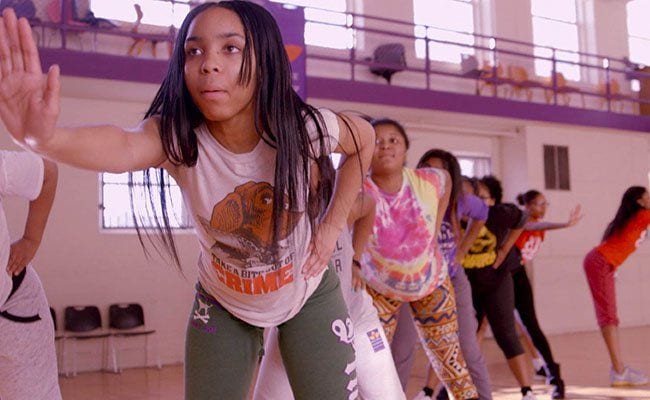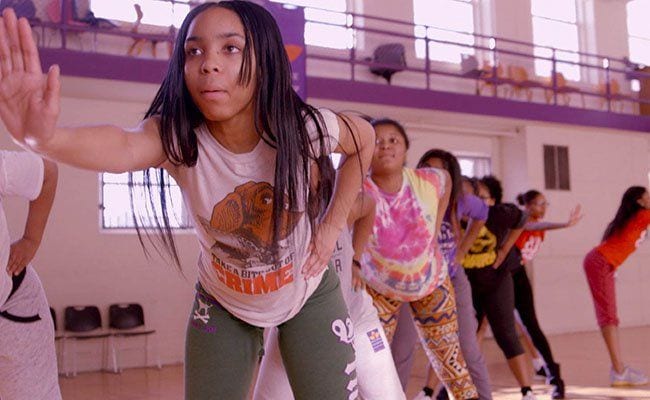
There are crowd pleasers, and then there is Step.
Over two decades removed from Hoop Dreams, the influential documentary about African-American teens trying to escape the inner-city, comes this inspired plea from Baltimore’s riot ravaged streets. Director Amanda Lipitz’ debut feature follows three young women as they struggle to navigate familial and societal dysfunction while preparing for college admission and dance competitions. Though a bit disjointed and thin, Step is an unrepentant hug in a world more accustomed to gut punches.
In April of 2015, an African-American man named Freddie Gray was arrested by the Baltimore Police Department. By the time he arrived at the station, Gray had sustained injuries so severe that he slipped into a coma and died one week later. Angry citizens took to the streets, looting, disrupting city services, and, eventually, prompting the dispatch of the Maryland Army National Guard.
For Blessin, Cori, and Tayla — three seniors attending the Baltimore Leadership School for Young Women (BLSYW, pronounced “Bliss”) — the backdrop of violence and rage is exasperatingly familiar. The school, initially opened for 6th graders in 2009, is preparing for its first graduating class, even as guidance counselor Paula Dofat (who deserves a medal for her patience) struggles to keep all of her students in good academic standing.
Our three heroines, however, only want two things in the world: to go to college and to win the upcoming step dance competition at nearby Bowie State. Step settles into a comfortable rhythm observing the blurring of these objectives for each girl, who sometimes lose focus entirely until a parent or teacher can intervene.
Cori, a brilliant girl with an infectious smile and quick wit, enjoys her standing at the top of the class, but acknowledges she isn’t the prototypical step dancer. For Cori, it’s Johns Hopkins or bust; a risky proposition, given Hopkins’ $60k per year price tag. Tayla, the clown of the group, has more modest aspirations. She’s the girl who can fit in anywhere but doesn’t really shine at anything. And her mother is a piece of work! Watching Tayla’s mother vicariously perform the step routines through her daughter is one of the film’s sublime charms.
Director Amanda Lipitz embeds her camera with each girl, mercilessly documenting their ordinary teenage ambivalence and extraordinary poverty. Cori bravely stifles tears when their power is disconnected (again), while Blessin stares at an empty refrigerator and wonders when she will eat again. Their only respite is the dance team; a structure that allows them to build character and to “make music with their bodies”.

And yet, Lipitz never allows the step dancing to dominate the story she’s telling. Yes, we see the rigorous training and exuberant competitions (some resembling the near-fever pitch of a religious ceremony), but dance does not define Blessin, Cori, and Tayla. What evolves over the taut 83-minute running time is, essentially, a story about mothers and daughters. This is a world populated almost exclusively by women, occasionally invaded by stepfathers and unsupportive boyfriends. If these women are going to survive, it will be through their own determination and economic resourcefulness.
What makes Step such an immediate emotional experience is that each girl has clearly defined abilities and shortcomings. It’s apparent that Blessin, who becomes the dominant focus of the story, is on the precipice of disaster. The fire she exudes during her step dance routines doesn’t translate to her academics, which threaten to preempt her acceptance into college. Watching this beautiful young woman prowl the stage like a force of nature makes the realization that she’s squandering her only means of escape all the more heartbreaking. Even her mother, who clearly suffers from depression and anger management issues, acknowledges that Blessin is probably doomed if she doesn’t go to college.
Where Lipitz sometimes falters as a first-time director is keeping the narrative uncluttered. Several scenes, such as when the step dance team visits the Freddie Gray memorial site, feel disconnected from the drama swirling around our three heroines. Yes, Gray’s murder (of which all of the accused officers were either acquitted or charges were dismissed entirely) and the Baltimore riots provide momentous subtext, but the sociopolitical implications often feel distant from what are, essentially, three personal stories.
That these personal stories so thoroughly resonate is evidenced by our desire to learn more about Blessin, Cori, and Tayla. Indeed, Step feels a bit truncated. You want to spend as much time as possible in the company of these determined young women. They look into the camera and show you their souls with startling honesty. Their indomitable spirit pulsates through dance routines that alternate between braggadocios posturing and audacious commentary (Black Lives Matter figures prominently in their final routine at Bowie State).
When the competition is finally over and the team disbands, what remains is the uncertain future of three women connected by unimaginably difficult circumstances. They are the faceless citizens so often forgotten, marginalized, or demonized as wards of public assistance programs. These are the types of young women so callously dismissed as “welfare queens” by Ronald Reagan back in the late ’70s.
In actuality, they understand the American Dream of deliverance through hard work better than most. To share in that dream with them, if only for a short time, is invigorating and life affirming. In that regard, Step, a film that doesn’t flinch from the racial and economic inequality in America, might be the most patriotic film of 2017.


![Call for Papers: All Things Reconsidered [MUSIC] May-August 2024](https://www.popmatters.com/wp-content/uploads/2024/04/all-things-reconsidered-call-music-may-2024-720x380.jpg)



